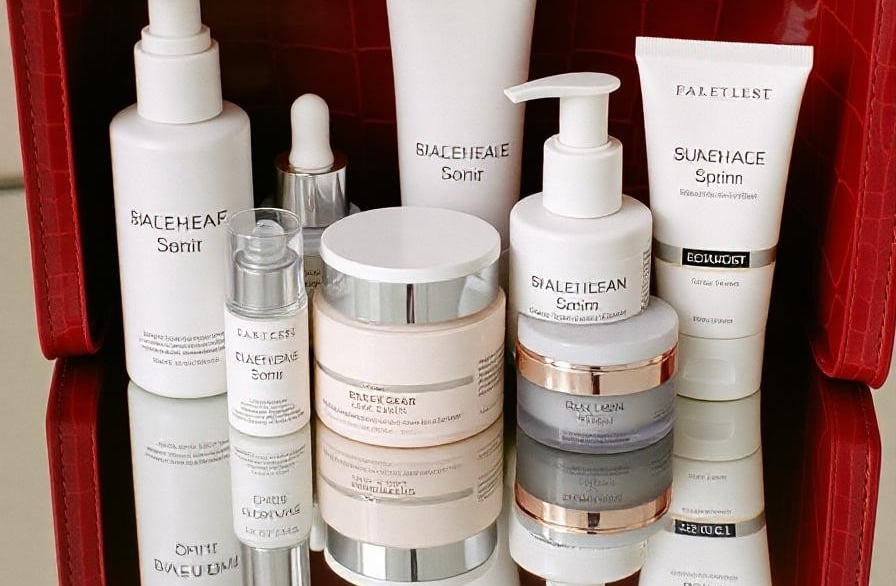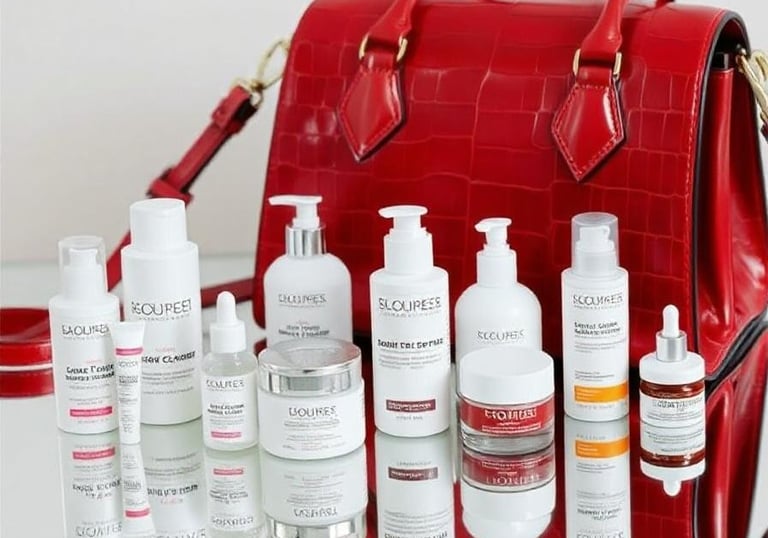Glutathione: The Controversial Skincare Ingredient
Glutathione is a skin whitening/lightening ingredient. Glutathione, the controversial skincare ingredient because it has been misused over the years though it a good skincare ingredient ..
SKINCARE INGREDIENTS


In terms of skin health, glutathione is celebrated for its ability to promote a radiant complexion. It works by inhibiting the production of melanin, the pigment responsible for skin color. By combating oxidative stress, glutathione also aids in reducing the visible signs of aging, such as fine lines and wrinkles, making it a sought-after ingredient in many skincare formulations. Though glutathione has come under scrutiny due to misuse by some individuals and professionals. With this pointed out lets look at its mechanism, benefits, risks and more,
What is Glutathione?
Glutathione is a tripeptide composed of three amino acids: cysteine, glutamine, and glycine. This remarkable compound is naturally synthesized in the human body and plays a critical role in various biological processes. One of its primary functions is acting as a powerful antioxidant, which helps protect cells from oxidative stress and damage caused by free radicals. High levels of glutathione are found in virtually every cell, particularly in the liver, where it is essential for detoxification processes.
MECHANISM
Glutathione works by inhibiting the tyrosinase enzyme which controls the production of melanin, the pigment responsible for skin color in skin. The more the melanin the darker the skin color. When tyrosinase is inhibited overtime, then the result is lower levels of melanin which can be seen as skin lightening.
FORMS OF GLUTATHIONE
When considering glutathione in the context of skincare products, it is crucial to note that there are different forms available, such as reduced glutathione and oxidized glutathione.
The reduced glutathione - (GSH) or L-glutathione is generally regarded as the more active version, as it is better at scavenging free radicals and supporting cellular function.
The oxidized glutathione - (GSSG) is inactive form of glutathione though when used in vivo it is reduced back to GSH. If high levels of GSSG are found in the cells then it means there is higher oxidative stress within the cell. Some topical applications claim to harness the benefits of glutathione for enhanced skin appearance, although opinions regarding their efficacy can vary.
Skeptics argue that the molecule's large size may hinder its absorption through the skin, questioning the effectiveness of topical glutathione treatments. Meanwhile, proponents emphasize the potential benefits of its use in formulations designed specifically for skin application.
What to Consider When Adding Glutathione to Your Skincare Routine
In recent years, glutathione has gained significant attention as a promising ingredient in skincare. However, before incorporating it into your regimen, it is essential to consider various factors that can influence its effectiveness and suitability for your needs. There are things to consider such as
Mode of delivery: Glutathione is available in several forms, including topical creams, IV(Intravenous) route and oral supplements. While topical applications allow for localized effects, oral supplements may offer systemic benefits. The choice between these methods largely depends on individual skin goals and preferences.
Skin type and sensitivity: Individuals with sensitive skin may need to approach glutathione cautiously, as it can cause reactions in some cases. Conducting a patch test with any new product containing glutathione can help determine if it suits your skin. Additionally, those with specific skin conditions, such as eczema or rosacea, should consult with a dermatologist before adding glutathione to their routine.
Formulation of glutathione containing-products: This plays a crucial role in their effectiveness. It is advisable to opt for products that feature stable and bioavailable forms of glutathione, as these will be more likely to provide the desired benefits. Moreover, consider potential interactions with other skincare ingredients, such as Retinol, Vitamin C or Vitamin E, as combining certain compounds can enhance or diminish effectiveness.
Incorporating glutathione into your skincare routine requires careful consideration of delivery methods, skin type, ingredient formulation, and potential interactions with other products. By being informed and vigilant, users can maximize the benefits of this controversial yet popular ingredient in their regimen.
Benefits of Glutathione in Skincare
Glutathione comes with numerous benefits some of which are discussed in detail as follows:
Scavenges on free radicals: It plays a significant role in promoting skin health by combating oxidative stress caused by environmental factors such as UV radiation and pollution. This oxidative stress can accelerate skin aging and lead to various skin concerns. By neutralizing free radicals, glutathione assists in protecting skin cells from damage, helping to maintain a youthful appearance.
Brightens uneven skin tone: This compound helps to inhibit the production of melanin, which is the pigment responsible for the color of the skin. Research has shown that topical applications or oral supplements of glutathione can lead to a visibly lighter complexion, reducing the appearance of dark spots and promoting an even skin tone. Anecdotal evidence from users frequently points to a more luminous look after incorporating glutathione into their skincare routines.
Reduces hyperpigmentation: It targets various types of pigmentation, including post-inflammatory hyperpigmentation(PIH) caused by acne or other skin irritations. Scientific studies indicate that regular use of glutathione may provide noticeable improvements in the complexion by fading dark patches over time. Health experts advocate for its inclusion in skincare regimes aimed at addressing pigmentation issues.
Enhances skin radiance: By supporting skin hydration and elasticity, it contributes to a plumper, more rejuvenated appearance. The cumulative effect of these benefits positions glutathione as a critical component of a comprehensive skincare strategy focused on achieving vibrant and healthy skin. As interest in this compound grows, more products featuring glutathione are being developed, catering to a wide audience seeking potent skincare solutions.
Risks of Glutathione in Skincare
Glutathione, often hailed for its antioxidant properties and potential to enhance skin appearance, carries certain risks that merit consideration. While many users endorse its benefits, there are documented side effects that can arise from its use in skincare products. One significant concern is the possibility of
Allergic reactions: Individuals with sensitive skin may experience adverse effects such as redness, itching, or hives after applying products containing glutathione. It is always advised to conduct a patch test before introducing a new ingredient to a skincare routine.
Skin irritation: It is another noteworthy risk to consider. Although glutathione is generally well-tolerated, the risk of irritation increases when it is used in high concentrations or in conjunction with other potent ingredients. This irritation can manifest as rashes, peeling, or a burning sensation, which can detract from the skin's overall health. Users are encouraged to monitor their skin's response and consult with a dermatological professional if complications arise. Though this is high likely to occur with the use of IV form of glutathione. Moreover, the implications of overuse of glutathione products are not fully understood. Some sources indicate that excessive use may lead to unforeseen side effects, emphasizing the importance of moderation.
A particularly controversial aspect of glutathione in skincare is its association with skin lightening. The ethical concerns surrounding this practice cannot be overlooked, as promoting lighter skin can reinforce societal pressures and harm self-esteem. This has prompted discussions within the beauty industry about the moral implications of endorsing skin-lightening products. Therefore, individuals must carefully weigh the benefits and risks of incorporating glutathione into their skincare regimen, considering both physical effects and broader societal impacts. Ultimately, a critical assessment of these factors is essential for making informed decisions regarding skincare practices.
Final Thoughts
As we have explored throughout this post, glutathione is a multifaceted component in the realm of skincare. Its potential benefits, ranging from skin brightening to anti-aging properties, make it a popular choice among skincare enthusiasts. However, the ongoing debates surrounding its efficacy, especially when used topically, warrant careful consideration. The effectiveness of glutathione can be influenced by various factors, including an individual’s skin type, formulation used, and potency.
In conclusion, as you navigate your skincare journey, keep in mind that what applies to one individual may not necessarily apply to another. Each person's skin is unique, and making informed choices based on personal needs and reactions is vital. The usage of glutathione should be evaluated in the context of a comprehensive skincare routine that aligns with individual goals, whether it’s combating hyperpigmentation, achieving a more radiant appearance, or otherwise enhancing skin vitality.


